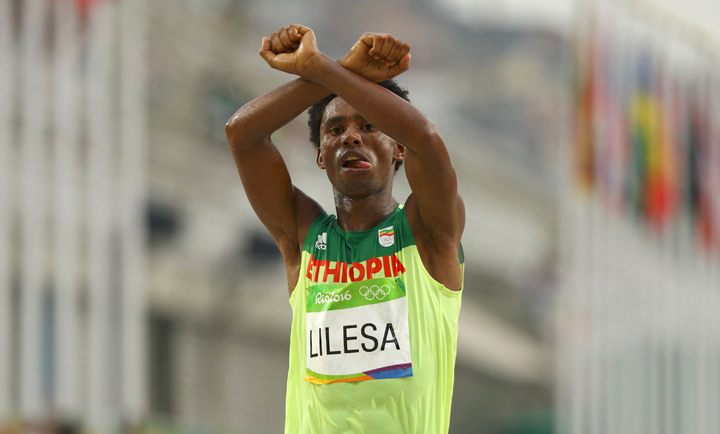San Francisco 49ers quarterback Colin Kaepernick courted controversy Friday after refusing to stand for the national anthem before a preseason game Friday.

Kaepernick, who led San Francisco to the 2013 Super Bowl said he sat on the bench during the U.S. national anthem to make a statement about racial injustice in the United States.
READ MORE: 49ers’ Colin Kaepernick will sit through anthem until there’s change
“I am not going to stand up to show pride in a flag for a country that oppresses black people and people of color,” Kaepernick said after the game. “To me, this is bigger than football and it would be selfish on my part to look the other way.”
But this isn’t the first time sports and politics have collided. Here is a look at some other moments when sports and politics have mixed:
Muhammad Ali

On April 28, 1967, boxing legend Muhammad Ali refused to be inducted into the armed forces during the height of the Vietnam war.
“My conscience won’t let me go shoot my brother, or some darker people, or some poor hungry people in the mud for big powerful America,” Ali said at the time.
His refusal eventually led to his arrest, a fine of $10,000 and a three-year boxing ban in the U.S.
Olympic athletes John Carlos and Tommie Smith
During the 1968 Olympics, U.S. athletes Tommie Smith and John Carlos raise their fists in the Black Power salute on the podium to express their opposition to racism in America. Smith won gold during the men’s 200m event at the Mexico Olympic Games; Carlos won bronze.
The Tenors
Canadian band The Tenors caused outrage when one of their members altered the lyrics to O Canada prior to the MLB All-Star Game at Petco Park in San Diego in July.
Singer Remigio Pereira sang “We’re all brothers and sisters. All lives matter to the brave,” instead of “With glowing hearts we see thee rise. The True North strong and free.”
READ MORE: Black Lives Matter Toronto co-founder baffled by Canadian anthem change by The Tenors
Pereira — who sang the altered lyric alone — also held up a sign during the performance saying “All Lives Matter” and the words “United We Stand” on the back of the sign.
The group later apologized for Pereira’s actions, explaining that he acted alone. Pereira addressed the incident on Twitter saying, “I’ve been so moved lately by the tragic loss of life and I hoped for a positive statement that would bring us ALL together. That was my singular motivation when I said all lives matter.”
WATCH: The Tenors strike a sour note over ‘All Lives Matter’ rendition of ‘O Canada’

St. Louis Rams
In 2014, members of the St. Louis Rams paid homage to Michael Brown – an unarmed black teenager who was shot and killed by police in Ferguson, Missouri – by holding their hands up during their pre-game introduction against the Oakland Raiders. The “hands up” symbol has become synonymous with the Black Lives Matter movement.
Carlos Delgado
Former Blue Jays slugger Carlos Delgado refused to stand during the singing of God Bless America, played during the seventh inning stretch in the U.S., during the 2003-2004 MLB season in protest of the Iraq war.
However, Delgado’s protest of the song wasn’t even made public until the Toronto Star published an article quoting Delgado as saying, “I think it’s the stupidest war ever. Who are you fighting against? You’re just getting ambushed now.”
Several NBA players

In 2014, several NBA players and teams wore shirts with the phrase “I can’t breathe” written on them, to protest the death of Eric Garner – a black man who died from his injuries after being put in a chokehold by police in California. Garner was heard saying the phrase 11 times while police held him down.
READ MORE: James, Irving and multiple Nets players warm up in ‘I Can’t Breathe’ shirts
NBA stars, including LeBron James and Kobe Bryant, wore the shirts during practices and warm-ups in support of the Black Lives Matters campaign.
“I respect…all of our players for voicing their personal views on important issues, but my preference would be for players to abide by our on-court attire rules,” said NBA Commissioner Adam Silver.
Ethiopian marathoner Feyisa Lilesa
During the Rio Olympics, Ethiopian marathoner Feyisa Lilesa staged a controversial political protest that overshadowed his silver medal finish in the Olympic marathon and left him fearing for his life.
READ MORE: Ethiopian marathoner fears for his life after making political protest gesture during race
As Lilesa crossed the finish line, he threw his arms over his head making an “X” in a show of support for members of his Oromo tribe. The Oromo tribe has been protesting the Ethiopian government’s plans to reallocate farmland surrounding the capital for development. The plans prompted fierce demonstrations last November, sparking the country’s worst unrest in more than a decade.
He later said he feared the government would kill him for his sign of protest.
– With files from The Associated Press and Global News’ Kevin Neilsen









Comments